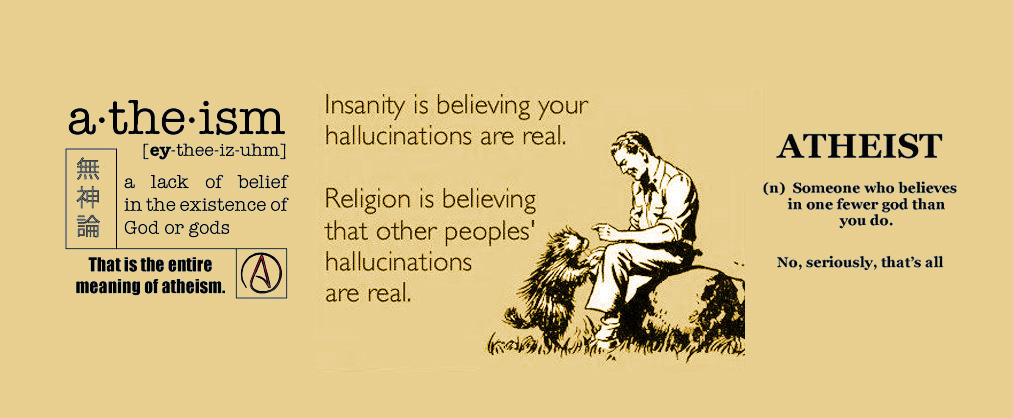Do you really believe our sense of morality comes from God? Have you ever heard or said that “the existence of objective morality is evidence for the existence of God?” Consider the following…
Subjective morality, by definition, is based on preferences. An example of subjective morality is when we collectively agree that action x is moral and action y is immoral because the consequences of each action are understood, and the outcome of action x consistently leads to a collectively preferred outcome and, action y leads to a collectively unfavorable outcome.
Objective morality, by definition, is that which is considered moral or immoral regardless of preferences. Objective morality cannot be a matter of opinion.
If morality were truly objective then by definition it could not be God’s opinion, meaning God is subject to the same morality we are, and we can see if god acts morally when measured against objective moral values. (He often doesn’t)
If god is the source of morality, because he has a plan (defined as a series of steps to reach a preferred outcome), and as part of that plan he created the moral values that would best lead to his preferred outcome, then God dictates his morality based on his preferences and that kind of morality is subjective.
If God decides what is moral, then morality is subjective by definition. It’s a matter of opinion, his.
In addition to subjective and objective morality we also have absolute morality which states that which is moral at all times regardless of circumstances. If you believe that killing is wrong all the time, no matter what, even in self-defense, or the defense of the innocent, then you subscribe to absolute morality. Of the three this is the most dogmatic, and least nuanced position. It is also apparent that we don’t find ourselves in a world where an absolute morality is governing everyone regarding killing as we see killing all the time. On this basis we can rule out absolute morality for every other moral situation as well.
The modern understanding of morality that seems to hold the most weight with non-believers recognizes that if we commonly accept the goal of wellbeing (defined as that which minimizes harm and maximizes benefit) as the basis for our moral judgments, then with respect to our agreed goal, we can objectively measure any actions effectiveness. So, the initial premise that underpins our moral judgements is subjective, but the subsequent rules we decide to follow will all have results that are objectively measurable and can therefore be considered objectively good or bad with respect to our goal.
Non-believers typically think human wellbeing should come before the wellbeing of a god that can’t be demonstrated to exist. Believers typically assert that their god exists and his wellbeing, his plan, his opinion, should come before that of humans. How about believers demonstrate their god does in fact exist, then we can argue about who’s opinion is superior with regard to moral judgements, humans or God?
Ever heard of the Euthyphro dilemma, it is one of the oldest examples of this very issue. According to the ancient Greek philosopher Plato, Socrates asks Euthyphro, “Is the pious loved by the gods because it is pious, or is it pious because it is loved by the gods?”
I submit to you that the answer to the ages old conundrum is found in our modern understanding of morality combined with our ability to recognize the flaw in how the question was worded. With respect to the latter, the presuppositions that gods exist and that they love that which is pious, are both unsupported. The very Gods spoken about here have been relegated to mythology. Of course, the substitution of any other god, even one you believe exists, changes nothing about the dilemma itself.
A better question is where does our morality come from? For those who are interested in the evolution of morality and a sense of fairness in social species, which is a somewhat well understood process, I recommend a google search, as it is getting clearer every day. Basically, social species like humans seem to demonstrate a sense of fairness and empathy, that manifests in socially normative behaviors, which when violated, can lead to members of the group being rejected and banished. For members of a social species the benefits of living in groups yields higher rates of survivability and increased reproduction. Those members that have strongly developed traits that help them get along with others have more offspring than those who don’t and over time populations of social creatures grow stronger and survive longer than their antisocial outcasts. We have quite literally evolved to be empathetic beings who care about the wellbeing of others in our group.
No superpowers are required to explain the emergence of moral behavior, and whenever we can demonstrate how something comes about from purely natural processes adding a supernatural element violates Occam’s razor about the simplest explanation being more likely true. It is simpler to explain things in terms of the natural processes we already understand and see exist in reality, than to give a supernatural explanation which can’t really be understood at all? Therefore, it is factually true to say “a God is less likely to be the source of our moral behavior than our empathy that we know exists.”
If you simply think this is a good time to say “God works in mysterious ways” which is an admission you can’t understand him, please see this post which demonstrates why you can’t possibly believe something you can’t understand.









